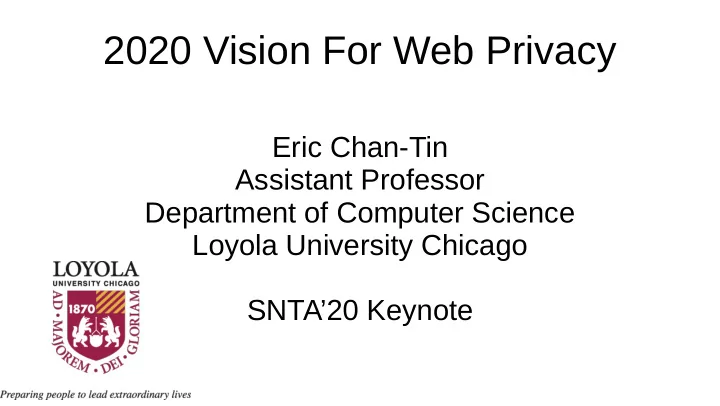

2020 Vision For Web Privacy Eric Chan-Tin Assistant Professor Department of Computer Science Loyola University Chicago SNTA’20 Keynote
What does Privacy mean to you?
What does Privacy mean to you? ● Personal – What you buy – What you do – Where you work/live – Name, social security number, phone number, DoB – Who you talk to
What does Privacy mean to you? ● Web ● Personal – What you buy – What you buy – What you do – What you do – Where you work/live – Where you are – Name, social security – Computer and browser number, phone number, information DoB – Who you communicate with – Who you talk to
Privacy in Hindsight ● Webcam/Babycam hack stories ● Target predicting girl was pregnant (2012) ● OPM, Equifax, Target, Marriott, etc. ● Advertisement
Personally Identifiable Information (PII) ● Name ● Address ● Zip code ● Gender ● Race ● Date of birth ● Web cookie
What is Privacy? ● Not necessarily just your name ● Can infer type of person you are based on what you do
What is Privacy? ● Not necessarily just your name ● Can infer type of person you are based on what you do ● Can link what you do – E.g. works at a university and likes sports
Web Privacy ADVERTISEMENT Pictures from ACLU.org and thejournal.com
Why? ● Over $100 billion in 2018 [CNBC] ● Censorship ● Collect data for use in the future
So what? Is that a bad thing? ● I got nothing to hide ● I trust the government ● It’s “just” advertisements
So what? Is that a bad thing? ● I have got nothing to hide ● I trust the government ● It’s “just” advertisements
How to? ● IP address ● Web cookie
How to? ● IP address ● DHCP or change location ● Web cookie ● Delete cookies
How to? ● DHCP or change ● IP address location ● Web cookie ● Delete cookies ● Evercookie – Restores cookie using flash storage, local storage, session storage, etc.
Changing this information (e.g. useragent) could make you more unique
K. Mowery and H. Shacham. Pixel Perfect: Fingerprinting Canvas in HTML5. IEEE W2SP 2012.
Tracking using Latency ● Javascript code on attacker.com (maybe served as an ad to victim.com) ● Timing attack to see if user visited example.org and is logged into example.org – In cache or not T. Van Goethem, W. Joosen, and N. Nikiforakis. The Clock is Still Ticking: Timing Attacks in the Modern Web. ACM CCS 2015
Others ● List of webbrowser extensions makes you unique (Xhound) ● Accessibility features ● Mobile tracking ● Cross-device tracking ● ...
What can you do? ● Do Not Track ● Install tracking-blocker tools ● Use a private browser
A. Vastel, P. Laperdrix, W. Rudametkin, and R. Rouvoy. FP-scanner: the privacy implications of browser fingerprint inconsistencies. USENIX Security 2018.
“Legitimate” Uses ● Banks to detect fraudulent logins ● Games to detect cheaters
How Prevalent? ● Long tail ● Becoming more common in most popular websites ● Some sites use different tracking tools
Browser Fingerprinting ● Here to stay ● You SHOULD be concerned about your privacy ● What if the tracking dataset gets leaked?
Network Traffic Analysis ● Assume that all communications are encrypted ● Assume that the eavesdropper is not the server nor the client ● What do you see?
Metadata ● Number of messages ● Size of each message ● Direction of the message
J. Yu and E. Chan-Tin. Identifying Webbrowsers in Encrypted Communications. ACM WPES 2014.
Website Fingerprinting
Closed World ● 90+% accuracy ● Predicting the correct website out of possible 1,000 websites
Open World ● 90+% accuracy ● High TPR, low FPR ● ~100 “monitored, sensitive” websites – E.g. facebook, wikipedia, attacker.com, etc ● ~1 million unmonitored websites ● Predicting whether network traffic is part of the monitored list or not – Binary classification
Future Privacy Impacts ● Track any citizen ● Predict who you are – Eliminate password authentication
New Privacy laws ● GDPR (May 2018) ● California Consumer Privacy Act (Jan. 2020)
Societal/Human Impacts ● Find and track bad ● Domestic partner actors surveillance ● Fraud prevention ● Political/Religious/ Ethnic/Personal surveillance
Picture from CNN.com
Arms Race ● Prevention vs Detection ● Tradeoff between privacy and “security”/“safety”
Are you sure you have nothing to hide?
Are you sure you have nothing to hide? ● Make your choice of tech ● Regulations ● Be careful what you “wish for”
Collaborators ● Yanmin Gong ● Anthony Sierra ● Jinoh Kim ● Christian Fields ● Shelia Kennison ● Julianna Chen ● Jiangmin Yu ● Spencer Johnston ● Tao Chen ● John Mikos ● Weiqi Cui ● Daisy Reyes
Acknowledgments ● This material is based upon work supported by the NSF under Grant No. IIS-1659645 and DGE- 1919004 ● Any opinions, findings, and conclusions or recommendations expressed in this material are those of the author(s) and do not necessarily reflect the views of the National Science Foundation
Thank You! chantin@cs.luc.edu Post on the Slack channel
Recommend
More recommend